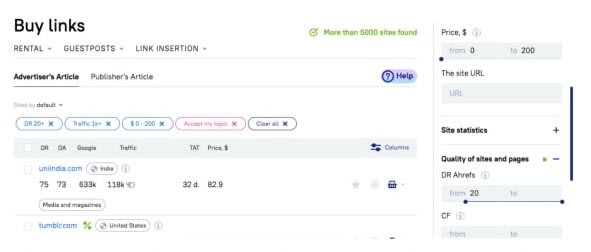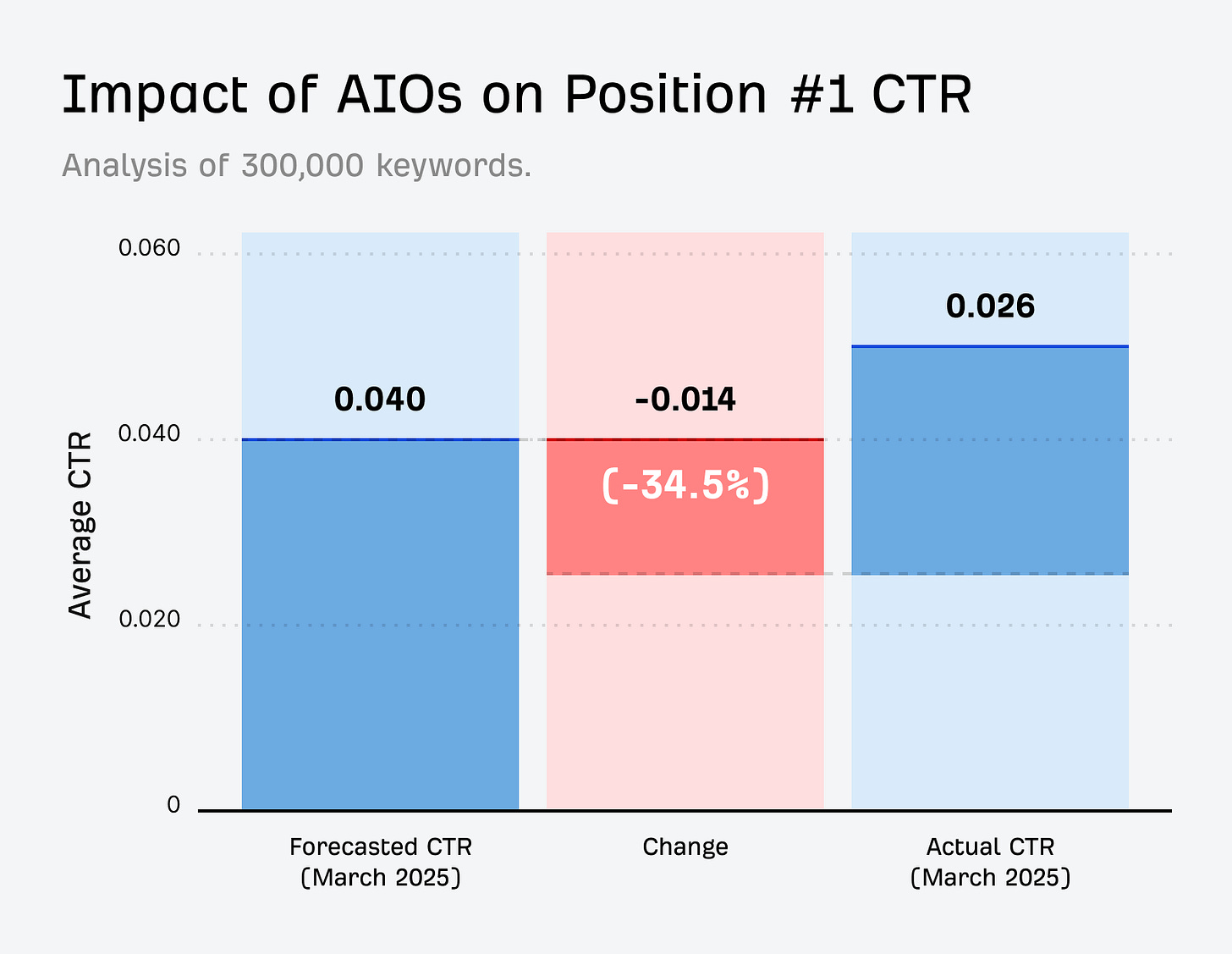AI vs SEO & PPC: What the Data Says
AI vs SEO & PPC: What the Data Says
Over the past few weeks, many top companies and agencies have been sharing valuable data around AI search, comparing it against Google search, and analyzing the impact of Google's own AI Overviews.
Keeping pace with AI developments in SEO and digital advertising may feel like a marathon you didn't sign up for but have to run anyway. Since AI's impact is reshaping how your audiences discover, engage, and convert, ignoring it isn't an option.
This week's B2B Marketing Shots is your no-BS guide to navigating the AI-driven search landscape.
*Serpzilla – Largest Link Building Platform
Save up to 90% of your time and budget.
Buy backlinks automatically.
Premium guest posts and niche edits on 150k media websites, 40+ metrics to evaluate website quality.
Schedule a demo and free consultation with our SEOs to learn more about Serpzilla and effective link building strategies.
*This newsletter is sponsored by Serpzilla.
AI is attracting engaged traffic and high-intent leads
Adobe Analytics recently analyzed over 1 trillion visits to retail websites and found traffic from generative AI sources surged an astonishing 1,200% between July 2024 and February 2025.
What stood out in that finding?
It’s not just vanity traffic; it’s high-quality, engaged traffic that actually moves the needle. These visitors spent more time, viewed more pages, and bounced less.
In short: AI-sourced traffic equals quality.
Digging deeper, Adobe's survey of 5,000 U.S. consumers reveals:
39% used generative AI for online shopping, with 53% planning to do so in 2025.
55% of respondents) use generative AI for conducting research.
47% use it for product recommendations.
43% use generative AI for seeking deals.
35% for getting gift ideas.
35% for finding unique products.
33% for creating shopping lists.
Docebo's Silvia Valencia echoes this with data-backed insights: 6% of their high-intent leads now originate from AI discovery, matching conversion rates from established high-intent channels. Interestingly, enterprise buyers remain notably absent from these AI-driven leads. At least for now.
Why?
Enterprise buying decisions are multi-layered, with several stakeholders involved.
AI might drive initial discovery, but final decisions often default to safety and established relationships.
Τakeaway: AI-driven search is an essential new acquisition channel. Optimize for discovery but don't neglect building brand trust, especially if you target enterprise clients.
AI searches vs Google searches
People have been calling time on SEO for years. First it was mobile, then voice search, now AI. But SEO keeps evolving, not disappearing. The reality, grounded in data from Rand Fishkin (original video, article & research) and SparkToro, is more nuanced:
Google currently processes roughly 14 billion searches daily. ChatGPT handles around 37.5 million, meaning Google search is still about 373 times bigger.
Even combining all generative AI search platforms, AI-driven searches barely scratch 2% of Google's total daily volume.
Does this mean AI can be ignored? Absolutely not. AI search is growing exponentially. But the narrative that "SEO is dead" keeps fanning the flames of drama. The truth is SEO continues to evolve; brands should adapt rather than abandon it.
Takeaway: Keep investing in SEO, but diversify your strategy to optimize content for AI-driven queries and visibility.
AI overviews are reshaping your organic (and paid!) traffic
Google's Search Generative Experience (SGE), or AI Overviews, is causing notable shifts in organic click-through rates. Sistrix and Advanced Web Ranking studies offer clear insights:
When an AI Overview appears, CTR can drop dramatically for lower-ranked results (sometimes by up to 70%).
The top result cited by Google's AI summary can actually experience increased clicks compared to a standard featured snippet.
Interestingly, SGE triggers predominantly on informational rather than transactional queries (Semrush). This means top-of-funnel content strategies need to evolve rapidly.
Kevin Indig’s meta-analysis of 19 recent AI Overview studies emphasizes that marketers should rethink content creation. Google increasingly prefers content that clearly demonstrates expertise, authority, and trustworthiness – qualities less likely replicated by generative AI alone.
Now here’s the wild part: when AI Overviews show up, they’re not just competing with organic results; they’re cutting into paid clicks too.There are examples where paid CTR dropped from 21.27% to 9.87% when AIOs showed up.
That’s a serious nosedive.
This phenomenon might still be rare, but the pattern is loud and clear: AIOs shift attention and they do it fast. If you’re investing in paid search, you need a plan for when AI shows up and steals your ad’s spotlight.
Ahrefs' more recent study that on average AI Overviews reduces the click-through rate for position 1 by ~34.5%. This is an average of 20-40% depending on the search query, industry, and niche.
Your takeaway: Target positions where your content can be prominently featured in AI Overviews. Invest in deep, authoritative content and a 360° marketing strategy because relying solely on SEO or PPC is short-sighted.
78% of new web content is partially AI-Generated
Tim Soulo's team at Ahrefs analyzed 770,000 new pages published in January 2025, revealing striking data:
21.6% human-only content.
3.4% fully AI-generated content.
75% mix of human and AI-generated content.
While AI-generated content is becoming the norm, relying solely on AI can be risky. Google's algorithms still prioritize originality, depth, and expertise. I am really looking forward to the whole research by Ahrefs, and more information on how they identified AI content, as I am pretty skeptical of any and all AI detectors. Yet the implication is clear: marketers should combine AI efficiency with genuine human expertise.
Takeaway: Embrace AI as a tool, not a replacement. Expert human insight paired with AI-driven efficiencies will yield the strongest SEO (and GEO) performance.
What should B2B Marketers do next?
Now, some actionable advice.
Improve content strategy:
Create deeper “how” and “why” content pieces using strong experts’ opinions, first-party data, and video. Then repurpose it across channels.
Prioritize content optimization for AI discovery:
Help users by providing brief, authoritative answers to their common questions.
Enhance brand visibility:
AI reduces visibility for lower-ranked pages. Try to create more top-ranking, highly optimized content for your website.
Double down on quality and originality:
Purely AI-generated content won't distinguish your brand. Blend automation with expert human perspective.
Monitor and adjust:
AI and SEO dynamics shift rapidly. Stay informed, agile, and ready to adjust strategy based on data.
Sponsored Insight
[Sponsored by Serpzilla – Largest Link Building Platform]
AI or not, backlinks remain critical. Serpzilla helps you automate your link-building, saving time and making better use of your budget. With 150k vetted media websites and robust analytics, they're a no-brainer to scale your link-building strategy effectively. Schedule a demo for more insights.
AI can become a real asset
Companies that treat AI as a core business driver – not just a side experiment – are pulling ahead. PwC makes it clear: the real advantage goes to those who bake AI into their strategy, not just operations.
These companies aren’t dabbling; they’re scaling, innovating, and actively reshaping their industries.
While others hesitate or overthink, the winners are already streamlining workflows, improving customer experiences, and uncovering new revenue streams (like AI search results).
Takeaway: AI isn’t a nice-to-have anymore. It’s a competitive edge. And those who wait too long? They’ll be playing catch-up.
The bottom line
Yes, AI is altering the SEO landscape significantly. But let’s stay realistic:
AI-driven search and discovery are growing, but traditional SEO isn't disappearing overnight.
Human creativity, authenticity, and strategic expertise remain critical differentiators.
Rather than fearing AI, leverage it strategically, combining automation with human expertise to build stronger, more resilient SEO strategies.
SEO isn't dead; it's simply evolving. So should your marketing.
That’s it for now. See you next time with another round of impactful insights for your marketing strategies.
If you got this far, it means you really enjoyed this edition.
Subscribe to get the B2B Marketing Shots directly to your inbox twice a month!






